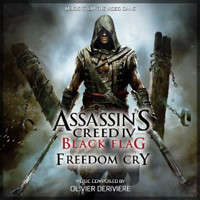- Composed by Olivier Derivière
- Ubisoft Music / 2014 / 70m
Freedom Cry is an extension to the Assassin’s Creed IV: Black Flag game, initially released as a downloadable extra late in 2013 before being released as a standalone game early in 2014. The action centres around a freed West Indian slave who gets caught up in various high jinks on the high seas in the Caribbean. The music for the main game was composed by Brian Tyler and was reasonably entertaining, but hampered by an overlong album release almost impossible to get through; for this spinoff the developers turned instead to French composer Olivier Derivière, fresh from his success composing the magnificent Remember Me, one of the strongest video game scores I’ve ever heard and my favourite album of 2013.
It turns out that actually Remember Me had some very serious competition during 2013 – I just didn’t know about it at the time because of the tardiness of the album release – because Freedom Cry is just as good. Indeed, some people might even like it more – the outstandingly creative electronic manipulation of the orchestra that was Remember Me‘s trademark is (obviously) not present here, in a wonderful orchestral and choral action/adventure score written somewhat in the mould of John Powell at his very best. Performed by strings of the Brussels Philharmonic and vocals and percussion courtesy of a Haitian group called Troupe Makandal, it is simply exceptional.
The album opens with “The Root”, the main theme (I believe a Haitian song) given a beautiful vocal treatment accompanied initially by furious orchestra that melds into a rich, moving, elegiac piece for strings (accompanied throughout by the voice). That contrast between the decency and triumph over adversity suggested by the vocals and the darkness of some of the orchestral fireworks is what makes the score so compelling. The second cue, “The Storm”, opens with a Wagnerian passage for strings which ebbs and flows like a violent sea before thrilling fast-paced action takes over. A secondary theme is introduced in “False Paradise”, a mellow piece with some chilled-out electronic and guitar accompaniment to the orchestra which turns out to be surprisingly moving once the strings move back to elegiac mode.
The action soon returns – “Fight the Tyranny” with its fast-paced string runs over a constant bed of percussion is like the best (and I mean the best) parts of Powell’s seminal Bourne scores – it’s gloriously thrilling music. “The Hideout” is slightly darker, more suspenseful, providing a little respite from the excitement; then the elegant “A Boat to Freedom” offers another feather to the score’s bow, beautifully written. “Attack at Sea” is another superb piece of action music, creative in its orchestration and genuinely different from most action music; and it continues in “Fight the Oppressors” and “Brothers and Sisters”, the excitement not letting up for a second and the latter providing a particularly thrilling moment when the choir joins in with the orchestra for the final bars.
A jaunty string run (one of the score’s few concessions to what you might expect of “pirate music”) is joined by percussion and guitar to start “On to Freedom” before a guitar takes up the main theme (heard for the first time since the opening cue), passing over again to the strings. It’s outstanding music – bold, creative, beautifully written and executed. The relentless action continues apace in “The Fight For All”, the choir again playing a brief but significant role in the thrills. “The Governor’s Lair” is a little (but only a little) more laid-back, the metronome beating slightly more slowly for the orchestra, the impassioned wailings of the choir suggestive of darkness and danger.
Don’t worry though – three minutes is quite long enough to spend away from the action and it’s back straight away in “Never Again” and “Last Chance”, the now-familiar mix of strings, guitar, subtle winds, percussion and (in the former) choir losing none of its appeal. There is an increasing sense of urgency, perhaps even desperation, in “The Last Chance” with a pulsating electronic accompaniment only adding to the excitement.
The lengthy “United” sees all the tension finally resolved, with an impressive emotional relief and the vocals now taking on a more celebratory, joyful tone. The impassioned “The Freedom Cry” closes the score, bringing it full circle back to its opening theme, emotions having been taken on quite a journey in that time. The album then includes seven traditional Haitian songs performed by the same group as the vocals in the score and entirely in keeping with its mood (indeed several of the melodies are also featured within the score). Freedom Cry is an exceptional album, better than any action-based film score I can remember in a long time – truly exciting, elegantly-written music, brilliantly recorded which comes with my highest recommendation.
Rating: *****
See also:
Assassin’s Creed IV: Black Flag Brian Tyler
Remember Me Olivier Derivière
facebook.com/moviewave | twitter.com/MovieWaveDotNet | amazon.com













So glad this has finally found a release! Derivière deserves such a wider audience.